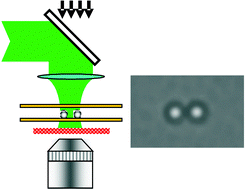Like-charge attraction in confinement: myth or truth?
Abstract
It is general wisdom that like-charged colloidal particles repel each other when suspended in liquids. This is in perfect agreement with mean field theories being developed more than 60 years ago. Accordingly, it was a big surprise when several groups independently reported long-ranged attractive components in the pair potential U(r) of equally charged colloids. This so-called like-charge attraction (LCA) was only observed in thin sample cells while the pair-interaction in unconfined suspensions has been experimentally confirmed to be entirely repulsive. Despite considerable experimental and theoretical efforts, LCA remains one of the most challenging mysteries in colloidal science. We experimentally reinvestigate the pair-potential U(r) of charged colloidal particles with digital video


 Please wait while we load your content...
Please wait while we load your content...